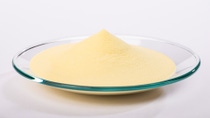BASF’s vitamin K1
What makes BASF’s vitamin K1 an excellent choice for your products and applications?
- Reliability +
- High-quality vitamin K1 powders manufactured in Ballerup, Denmark.
- Decades of experience in microencapsulation technology.
- Quality +
- Encapsulation of vitamin K1 oil improves handling and eases dosing, as well as protection from degradation.
- Kosher and Halal certified.
- No cooling required (≤ 25°C ).
- Long retest period (36 months).
- Performance +
- Ideal for use in dietary supplements (e.g. tablets, hard shell capsules) and functional foods (e.g. cereals, dietetic products).
- Easy to use in downstream processing.
- High stability in tablet applications with minerals.
- Sustainability +
- Efficient handling of resources enabled by the Verbund.
- Product Carbon Footprint (PCF) calculated for our vitamin K1 products according to industry standard (TÜV Rheinland certification).






